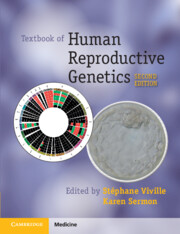Book contents
- Textbook of Human Reproductive Genetics
- Textbook of Human Reproductive Genetics
- Copyright page
- Contents
- Contributors
- Chapter 1 Basic Genetics and Cytogenetics: A Brief Reminder
- Chapter 2 Application of Whole-Genome Technologies to Assisted Reproductive Treatment
- Chapter 3 Meiosis: How to Get a Good Start in Life
- Chapter 4 Chromosomes in Early Human Embryo Development: Incidence of Chromosomal Abnormalities, Underlying Mechanisms, and Consequences for Diagnosis and Development
- Chapter 5 DNA Is Not the Whole Story: Transgenerational Epigenesis and Imprinting
- Chapter 6 Genes Are Not the Whole Story: Retrotransposons as New Determinants of Male Fertility
- Chapter 7 Chromosomal Causes of Infertility
- Chapter 8 Genetics of Human Male Infertility: The Quest for Diagnosis and Treatment
- Chapter 9 Genetics of Human Female Infertility
- Chapter 10 Preconception Genetics Analysis/Screening in IVF
- Chapter 11 Genetic Counseling in Assisted Reproductive Treatment
- Chapter 12 Mitochondrial Genetics in Reproductive Medicine
- Chapter 13 Preimplantation Genetic Testing
- Chapter 14 Epigenetics and Assisted Reproductive Technology
- Chapter 15 Human Reproductive Genetics in Medically Assisted Reproduction: Ethical Considerations
- Index
- References
Chapter 15 - Human Reproductive Genetics in Medically Assisted Reproduction: Ethical Considerations
Published online by Cambridge University Press: 15 December 2022
- Textbook of Human Reproductive Genetics
- Textbook of Human Reproductive Genetics
- Copyright page
- Contents
- Contributors
- Chapter 1 Basic Genetics and Cytogenetics: A Brief Reminder
- Chapter 2 Application of Whole-Genome Technologies to Assisted Reproductive Treatment
- Chapter 3 Meiosis: How to Get a Good Start in Life
- Chapter 4 Chromosomes in Early Human Embryo Development: Incidence of Chromosomal Abnormalities, Underlying Mechanisms, and Consequences for Diagnosis and Development
- Chapter 5 DNA Is Not the Whole Story: Transgenerational Epigenesis and Imprinting
- Chapter 6 Genes Are Not the Whole Story: Retrotransposons as New Determinants of Male Fertility
- Chapter 7 Chromosomal Causes of Infertility
- Chapter 8 Genetics of Human Male Infertility: The Quest for Diagnosis and Treatment
- Chapter 9 Genetics of Human Female Infertility
- Chapter 10 Preconception Genetics Analysis/Screening in IVF
- Chapter 11 Genetic Counseling in Assisted Reproductive Treatment
- Chapter 12 Mitochondrial Genetics in Reproductive Medicine
- Chapter 13 Preimplantation Genetic Testing
- Chapter 14 Epigenetics and Assisted Reproductive Technology
- Chapter 15 Human Reproductive Genetics in Medically Assisted Reproduction: Ethical Considerations
- Index
- References
Summary
This chapter on the ethics of human reproductive genetics focuses on current debates in three corners of the field of medically assisted reproduction (MAR). First, we discuss preimplantation genetic testing (PGT). Until recently, ethical debates concentrated on PGT “on indication,” formerly termed preimplantation genetic diagnosis (PGD), namely testing of embryos on behalf of couples mostly at high risk of transmitting a specific genetic disorder. As important, however, is the ethics of (the offer of) routine testing of in vitro fertilization (IVF) embryos, formerly termed preimplantation genetic screening (PGS). Although it is still unclear what the precise value of such screening may turn out be, the scenario of next generation sequencing (NGS)-based “comprehensive PGS” raises a number of challenging ethical issues. Secondly, we discuss carrier screening. In MAR, until recently this type of screening targeted gamete donors. Presently, however, a growing number of clinics have started offering carrier screening to applicants of MAR as well. As discussed in Chapter 10, new NGS technologies are expected to make broad-scope testing for many genetic conditions feasible and affordable. Accordingly, what should we test gamete donors and applicants of MAR for and why? Finally, we add a brief ethical reflection on what may become a (or the) real revolution in human reproduction: germline genome editing.
- Type
- Chapter
- Information
- Textbook of Human Reproductive Genetics , pp. 219 - 236Publisher: Cambridge University PressPrint publication year: 2023
References
- 2
- Cited by

